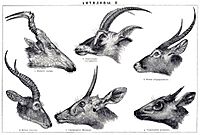Wastebasket taxon facts for kids
A wastebasket taxon is a term used by biologists for a taxon which has organisms that do not fit anywhere else.
Species or groups are put in the wastebsket taxon when they do not fit into one of the regular taxa. Regular taxa are supposed to be monophyletic. By definition, wastebasket taxa are either paraphyletic or polyphyletic. Their name may still be very useful to biologists, because its members may be an important evolutionary grade. Antelopes are a group which is ecologically very important, and have many similar features. However, they are not monophyletic. Species are called 'antelopes' if they look like one.
Invertebrates are often called the "everything-else" category, meaning all animals without backbones. Little-known fossil groups are sometimes later found to be wastebasket taxa. The crocodile-like Triassic group Rauisuchia is an example.
Loosely related animals often look rather alike. This is because they adapt to similar environments. This leads to convergent evolution.
See also
 In Spanish: Taxón cajón de sastre para niños
In Spanish: Taxón cajón de sastre para niños


